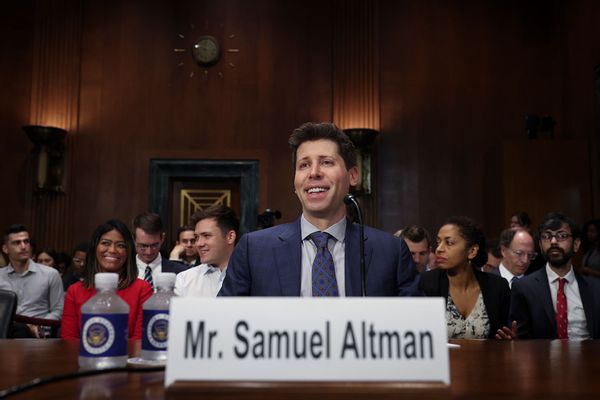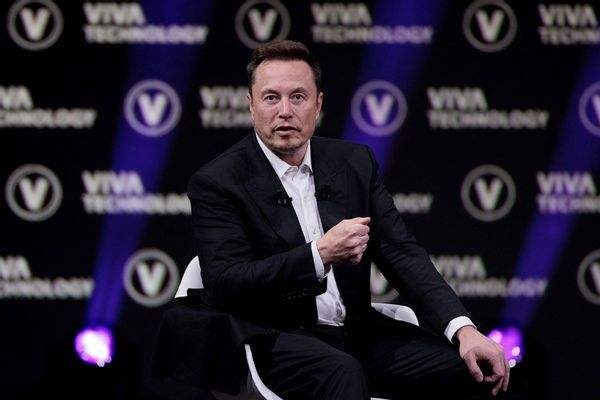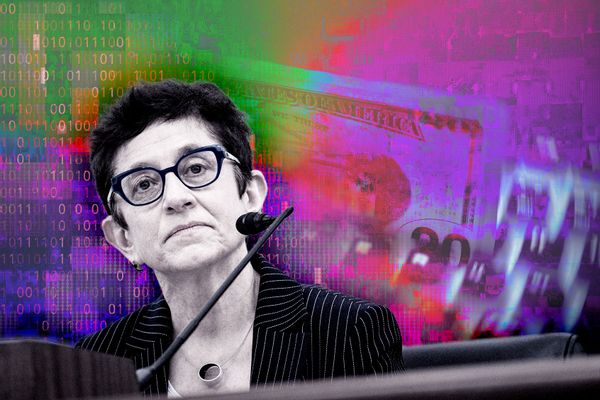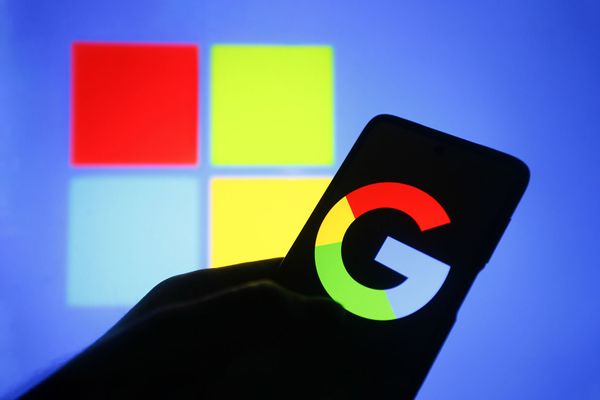Just when we thought America’s spiraling descent into tech-fueled corporate surveillance dystopia couldn’t get any more gallows-hilarious, 2023 came along to prove us wrong. Even setting aside the explosive rise of artificial intelligence into every internet corridor, it’s still remarkable how many incredibly dumb battles were lost when surveying the tech fails of the past year.
On the social media front, we glimpsed a new kind of tech-focused Sinophobia from Congress members during hearings on TikTok. We also witnessed billionaires get into online slap-fights that were so pathetic they made the early-90s forum flame-wars look like United Nations debates. But away from the circus of superficiality and the reckless scattershot of AI companies, more pressing matters took shape that deserved attention.
We need your help to stay independent
The Department of Homeland Security got caught with its hand in the surveillance cookie jar again, despite having more pressing things to do — like hopefully preventing a major cyberattack by neo-Nazis. Meanwhile, the Right-wing tech Medici of Silicon Valley, Peter Thiel, appeared to be a major influence on one of the valley’s worst bank runs. Then the Pentagon asked for a new suite of nuclear bombs more powerful than anything we’ve ever seen. And that’s not even mentioning Google’s monumental case before the Supreme Court.
Depending on the particular flavor of your coping mechanisms and how deeply into tech you are, 2023 was a year in tech that likely either overwhelmed your stress responses enough to make you numb and apathetic to the whole ordeal or possibly just radicalized your convictions in some way. And if you experienced neither? Then here’s a list of the worst garbage-fire moments in tech that made the rest of us feel like our brain’s short-circuited this year.
The unholy swarm of AI wretchedness
 Samuel Altman, CEO of OpenAI, appears for testimony before the Senate Judiciary Subcommittee on Privacy, Technology, and the Law May 16, 2023 in Washington, DC. (Win McNamee/Getty Images)Image_placeholder
Samuel Altman, CEO of OpenAI, appears for testimony before the Senate Judiciary Subcommittee on Privacy, Technology, and the Law May 16, 2023 in Washington, DC. (Win McNamee/Getty Images)Image_placeholder
Let’s get this out of the way right now because not only did the explosion of AI in 2023 prove to be the dominant strain of brain rot among tech news topics, its towering philosophical stupidity ultimately rose to overshadow a lot of otherwise quite pressing tech fails that deserve to be slung into the literary sky and double-barrel obliterated like clay pigeons.
While some lawmakers fumbled with the topic like a freshman fumbling with a bra hook in the backseat, others seemed genuinely interested and informed — seeking to craft a careful set of AI-use regulations with the aid of informed testimony from academics, activists, and industry leaders. Thus, the stage was set this year for Open AI CEO Sam Altman’s Congressional charm offensive. It was a hit.
That’s nice and all, but nothing much seemed to change. Bills protecting personal data and copyright seemed to go nowhere, a spate of regulatory proposals fizzled and died, and President Joe Biden’s executive order on AI doesn’t seem (yet) to have any real teeth. Meanwhile, some sites are offering “bounties” for people who are wiling to drum up some AI-generated deepfake pornography of women they know. And none of these tech giants seems to care how more and more of these deepfakes are of little girls — or at least not enough to stomp this garbage out with the same tenacity that they stomp out user-posted links to pirated Disney movies.
When I say that I believe this year in tech radicalized a lot of people, I don’t mean it in an insulting way, nor in a partisan way. This kind of thing should indeed radicalize us toward healthy material action if we have anything of a conscience left. And, if we’re lucky, it might just do it effectively enough to create new cohesion among ideologically diverse groups who are all similarly sick of kids getting sexually targeted and exploited this way. Here’s hoping.
NASA, do you still love us?
 In this handout image provided by the European Space Agency (ESA) and NASA, the International Space Station and the docked space shuttle Endeavour orbit Earth during Endeavour's final sortie on May 23, 2011 in Space. (Paolo Nespoli - ESA/NASA via Getty Images)
In this handout image provided by the European Space Agency (ESA) and NASA, the International Space Station and the docked space shuttle Endeavour orbit Earth during Endeavour's final sortie on May 23, 2011 in Space. (Paolo Nespoli - ESA/NASA via Getty Images)
If you want to know what the opposite of “planned obsolescence” looks like in tech, then all you’ve had to do for the last 20 years in look up at the sky and watch the International Space Station pass overhead.
A symbol of hope for international academic cooperation, and NASA’s long-running bet on a future where scientific pursuits are for the purpose of knowledge and species-wide benefit as opposed to military supremacy — the decision to kill the ISS and watch it (at least partially) crash into the sea was a psychological uppercut with the same relative force and momentum as watching Old Yeller get shot.
NASA, we didn’t need that L this year. Why couldn’t you just tell us that you were sending the ISS to live on a farm upstate? At the very least, can you please just hit the brakes on the nightmarish pursuit of a future where space exploration is relegated solely to private companies who vampirically slurp up publicly-funded scientific research?
If not, no worries. Just thought I’d ask because sometimes I don’t know if you still love us or not, and I’m tired of seeing you outsource our relationship to a third-party like Elon. I know you’re busy and could use the help but it just doesn’t feel believable when he says “of course, I still love you.”
He coulda been a contender
 SpaceX CEO and Twitter-purchaser Elon Musk (JOEL SAGET/AFP via Getty Images)
SpaceX CEO and Twitter-purchaser Elon Musk (JOEL SAGET/AFP via Getty Images)Cybersecurity theater and The Aristocrats
 Department of Homeland Security (DHS) building. (JASON REDMOND/AFP via Getty Images)
Department of Homeland Security (DHS) building. (JASON REDMOND/AFP via Getty Images)The most messed-up thing about the Department of Homeland Security getting exposed for operating a “shady” surveillance program unchecked, is that they have so many other pressing priorities to address that you’d think they’d be a bit busy. Aren’t the DHS supposed to be focused on making sure US infrastructure is secured against the rise in neo-Nazi cyberattacks that has them so “concerned”?
Or how about they help some other agencies take a look at the Fed hacks that happened this year that involved a deeply weird deployment of porn? At the very least, the Securities and Exchange Commission could probably use some help with its exhausting marathon game of Whack-a-Mole that it’s been playing against cryptocurrency launderers. Maybe the DHS could even meet Lindsey Lohan and the other flashy celebs that got sued for shifty crypto fiddling?
If that’s not interesting, maybe DHS could focus more on making sure that the Pentagon’s nuke silos and surrounding local areas are not full of hacker-friendly holes. After all, if the Pentagon is going to keep begging for an entirely new fleet of nuclear weapons more powerful than anything we have ever seen, then I guess someone should make sure some third-party contractors aren’t accidentally leaving the digital barn door open.
Democrats mostly letting Sohn twist in the wind alone
 Gigi Sohn (Photo illustration by Salon/Getty Images)
Gigi Sohn (Photo illustration by Salon/Getty Images)The hardest thing to watch in the world of tech aren’t the can’t-look-away moments where massive corporations legally get away with Lex Luther antics, but when you see an ethics titan take a fall.
It was hard to watch Biden’s Federal Communications Commission nominee, Gigi Sohn, get smeared in a homophobic campaign by Right-wing groups. It was even harder to watch most Democrats sit it on their hands and return no campaign punches, leaving her out there to take the hits largely alone.
"As someone who has advocated for my entire career for affordable, accessible broadband for every American, it is ironic that the 2-2 FCC will remain sidelined at the most consequential opportunity for broadband in our lifetimes," Sohn said in her statement. "This means that your broadband will be more expensive for lack of competition.”
"It is a sad day for our country and our democracy when dominant industries, with assistance from unlimited dark money, get to choose their regulators. And with the help of their friends in the Senate, the powerful cable and media companies have done just that."
Sad day, indeed. They did Gigi dirty, and I hope I'm around to laugh when comeuppance finally arrives for those responsible. Here's hoping FTC Chair Lina Khan keeps fighting the good fight, and that this isn't the last we see of Sohn.
Microsoft mewling about Google in the biggest tech monopoly case since Microsoft got similarly sued
 In this photo illustration, a Google logo is seen on a smartphone with a Microsoft logo in the background. (Photo Illustration by Pavlo Gonchar/SOPA Images/LightRocket via Getty Images)
In this photo illustration, a Google logo is seen on a smartphone with a Microsoft logo in the background. (Photo Illustration by Pavlo Gonchar/SOPA Images/LightRocket via Getty Images)What could be more hilarious and rich than Microsoft whining to the US Supreme Court about Google maybe having a monopoly? If you pitched it as fiction, they’d say you were too on the nose.
The Justice Department and 38 US state attorneys general accused Google of using monopolistic business practices to corner the search-engine market by illegally paying Apple billions of dollars to make Google the default search engine of Apple’s Safari browser. That seems a bit overdue, but fairly tame as far as a joke setup. The punchline, though, is that despite the whole hearing centering on a possible illegal pay-for-play deal between Google and Apple, Microsoft openly told the court that it too was also ready to throw down $15 billion a year if Apple would just choose Bing for its products’ default search engine instead of Google.
The withering pleas of Microsoft fell on deaf ears among those who watched Microsoft gather into a literal monopoly through the early '90s, then fight its way through a losing battle in 1998 as the feds sued it for using a 70% market share to further entrench itself with anti-competitive behavior. The Google antitrust case is the biggest since then.
“Everybody talks about the open web, but there is really the Google web,” Microsoft’s CEO said at the trial.
It’s difficult to imagine a more delicious scene than that of Microsoft, decades after its backstabbing of Apple, falling to its knees and begging for Apple’s help as Google threatens to crush the once-ruler of the desktop world. Difficult, yes — but not impossible. Just ask any devoted Linux user.



Shares